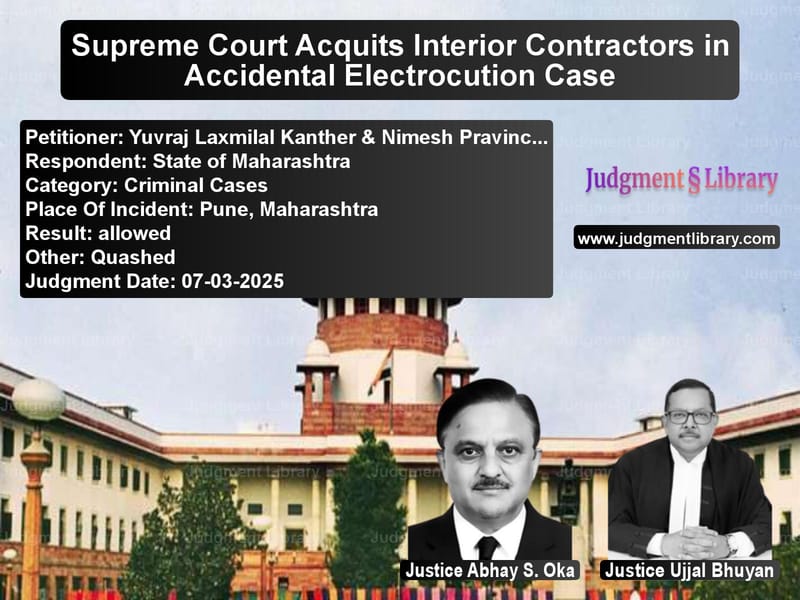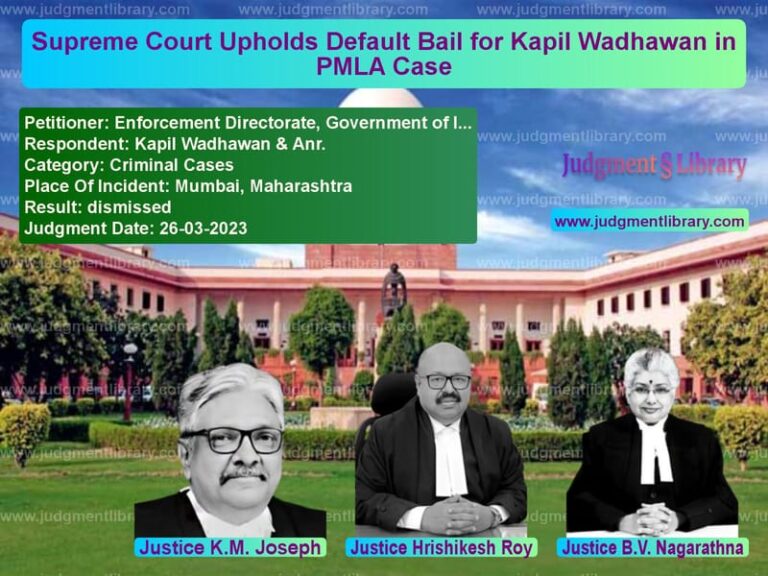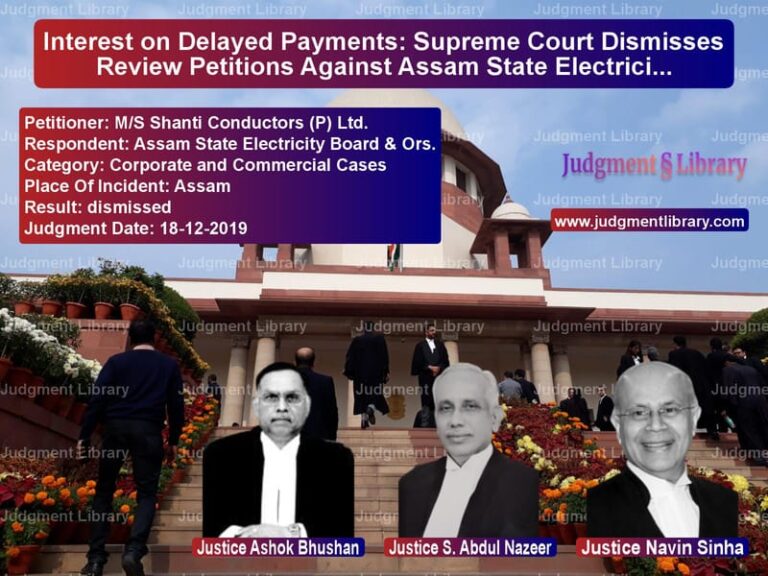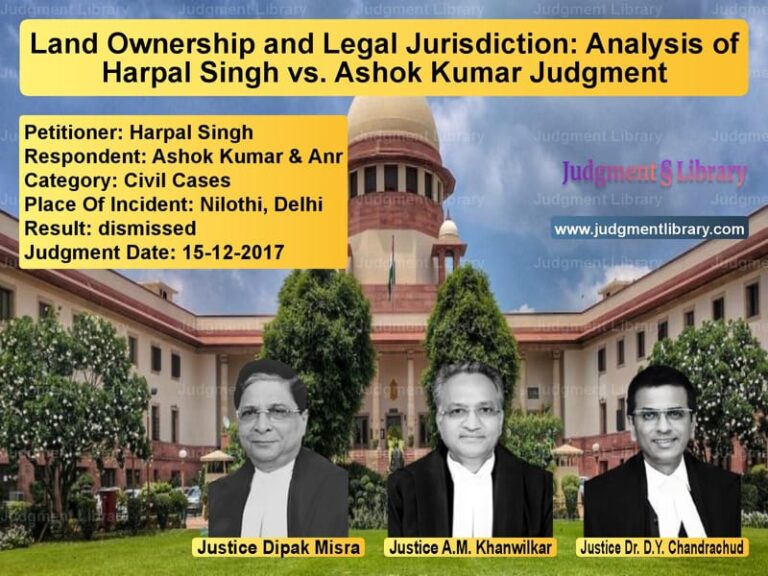Supreme Court Acquits Interior Contractors in Accidental Electrocution Case
The Supreme Court of India recently ruled on an important case involving workplace safety and criminal liability. The case centered around two interior decorators, Yuvraj Laxmilal Kanther and Nimesh Pravinchandra Shah, who were accused of criminal negligence after two workers died due to electrocution while working on a signboard. The Court overturned their prosecution under Section 304 Part II IPC, ruling that no prima facie case was made against them and acquitted them of all charges.
Background of the Case
The case originated from an incident on September 27, 2013, in Pune. The two accused were working as contractors:
- Appellant No. 1, Yuvraj Laxmilal Kanther, was responsible for the interior decoration of a shop.
- Appellant No. 2, Nimesh Pravinchandra Shah, was the Store Operation Manager of M/s. Intergold Gems Private Limited, which had leased the shop.
On the night of the incident, two employees of Appellant No. 1, Salauddin Shaikh and Arun Sharma, were working on the shop’s signboard, approximately 12 feet above the ground. While working on an iron ladder, they accidentally touched a live electrical wire, got electrocuted, and fell, suffering fatal injuries.
Filing of Charges and Arrests
Following the accident:
- Accidental death reports were initially registered under Section 174 of the CrPC.
- On December 4, 2013 (more than two months after the incident), a formal FIR (No. 316/2013) was lodged at Vishrambag Police Station, Pune, by PSI S.G. Patil, citing negligence.
- The FIR alleged that the accused did not provide necessary safety gear like belts, helmets, or rubber shoes to the deceased workers.
- The accused were arrested on the same day but were released shortly afterward.
- They were charged under Sections 304A, 182, 201, and 34 IPC.
Trial Court Proceedings
The case was committed to the Additional Sessions Judge, Pune, where it was numbered as Sessions Case No. 749 of 2014. The prosecution argued that:
- The accused were aware of the risks but still failed to provide safety equipment.
- Their negligence directly led to the electrocution of the workers.
- There was strong suspicion that they had committed an offense under Section 304 Part II IPC, which deals with culpable homicide not amounting to murder.
The accused filed discharge applications under Section 227 CrPC, arguing that:
- There was no evidence of intent or knowledge that their actions could cause death.
- The incident was a tragic accident, not a criminal act.
- They were not present at the site when the incident occurred.
- Safety provisions were not explicitly required for such work.
However, the Trial Court dismissed their discharge plea, holding that there was enough material to frame charges.
High Court Proceedings
Aggrieved by the dismissal of their discharge applications, the accused approached the Bombay High Court in Criminal Revision Application No. 269 of 2017. However, the High Court upheld the Trial Court’s decision, ruling that:
- The accused failed to take adequate safety measures.
- There was a strong suspicion that they had knowledge of the risks but ignored them.
- They could be held liable under Section 304 Part II IPC.
Following this, the accused filed a Special Leave Petition (SLP) before the Supreme Court.
Supreme Court’s Review and Verdict
The Supreme Court examined the evidence and held:
- No prima facie case under Section 304 Part II IPC: The Court ruled that culpable homicide requires the accused to have knowledge that their actions were likely to cause death, which was absent in this case.
- No criminal negligence under Section 304A IPC: The Court found that while the workers were not provided with safety gear, this alone did not amount to criminal liability.
- The incident was purely accidental: The Court ruled that an accident, no matter how tragic, does not automatically mean criminal liability.
- Compensation already provided: The accused had already compensated the families of the deceased workers, providing financial relief and employment to the brother of one of the deceased.
“There was no intention to cause death or bodily injury, nor was there any knowledge that such an act was likely to result in death. The ingredients of Section 304 Part II IPC are absent.”
Accordingly, the Supreme Court set aside the previous orders, allowed the discharge applications, and acquitted the accused.
Key Takeaways from the Judgment
- Workplace accidents do not automatically result in criminal liability: The Court reaffirmed that negligence must be proved beyond reasonable doubt.
- Culpable homicide requires knowledge or intent: The judgment clarified that Section 304 Part II IPC does not apply to cases of workplace mishaps without intent.
- Employers must ensure workplace safety: While not criminally liable, the case highlights the importance of providing safety equipment to workers.
- Compensation is an important factor: The Court acknowledged that the accused had compensated the victims’ families, which played a role in their acquittal.
Conclusion
The Supreme Court’s decision in this case sets an important precedent for workplace safety and criminal liability in accidental deaths. It reinforces the principle that criminal intent or knowledge must be established beyond doubt before imposing criminal liability under Sections 304 or 304A IPC. While the ruling acquitted the accused, it also serves as a reminder that employers must take proactive steps to ensure worker safety, even in non-hazardous industries.
Petitioner Name: Yuvraj Laxmilal Kanther & Nimesh Pravinchandra Shah.Respondent Name: State of Maharashtra.Judgment By: Justice Abhay S. Oka, Justice Ujjal Bhuyan.Place Of Incident: Pune, Maharashtra.Judgment Date: 07-03-2025.
Don’t miss out on the full details! Download the complete judgment in PDF format below and gain valuable insights instantly!
Download Judgment: yuvraj-laxmilal-kant-vs-state-of-maharashtra-supreme-court-of-india-judgment-dated-07-03-2025.pdf
Directly Download Judgment: Directly download this Judgment
See all petitions in Negligence Claims
See all petitions in Worksite Accidents
See all petitions in Contract Disputes
See all petitions in Judgment by Abhay S. Oka
See all petitions in Judgment by Ujjal Bhuyan
See all petitions in allowed
See all petitions in Quashed
See all petitions in supreme court of India judgments March 2025
See all petitions in 2025 judgments
See all posts in Criminal Cases Category
See all allowed petitions in Criminal Cases Category
See all Dismissed petitions in Criminal Cases Category
See all partially allowed petitions in Criminal Cases Category







